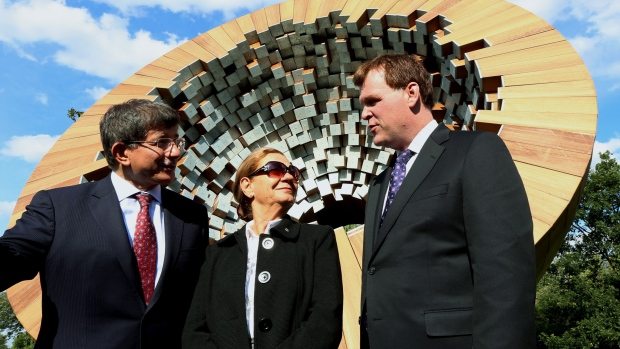
Turkish Minister of Foreign Affairs Ahmet Davutolu (left to right), Ayla Alikat, widow of fallen diplomat Col. Atilla Altikat, and Canadian Foreign Affairs Minister John Baird stand in front of a monument in Ottawa Thursday September 20, 2012 after an unveiling ceremony. (Fred Chartrand/THE CANADIAN PRESS)
Share:
http://www.sunnewsnetwork.ca/sunnews/world/archives/2012/09/20120920-211102.html
Related Stories
Published Thursday, Sep. 20, 2012 8:43PM EDT
OTTAWA — The Harper government unveiled a controversial monument on Thursday to slain diplomats on the spot where a Turkish diplomat was gunned down in Ottawa 30 years ago, allegedly by Armenian terrorists.
The cone-shaped metal-and-wood monument is dedicated to Col. Atilla Altikat, the slain military attache of the Turkish embassy, and is also meant to commemorate all fallen diplomats.
Foreign Affairs Minister John Baird referred to the recent killing of the U.S. ambassador to Libya, and three fellow diplomats, as he unveiled the monument with his Turkish counterpart, Ahmet Davutolu, who travelled to Ottawa for the event.
The monument also represents an olive branch from Canada to Turkey because of a rift caused by the Harper government’s decision in 2006 to recognize as genocide the killing of Armenians by Ottoman Turks in the First World War.
The move angered Turkey, a NATO ally, and led to the temporary withdrawal of its ambassador to Ottawa.
“The monument today showed the positive sentiments from the Canadian government regarding to our loss. But still of course the criminals who killed, the terrorists who killed our colonel here have not been arrested or found. The investigation is continuing,” Davutolu said Thursday.
Davutolu restated his government’s position that it would like to strike a joint commission with Armenians to discuss the historical facts surrounding the issue.
He said it was “unacceptable” for a nation to be accused of genocide.
“If Canada wants to contribute to the Turkish-Armenian reconciliation, the best way is to contribute in forming joint commissions, speaking with both sides about a fair and just memory and working together,” said Davutolu.
Baird did not back away from his government’s earlier position, but said he appreciates a dialogue on the issue.
Baird said he appreciated the sensitivities associated at play as well.
Baird affirmed the internal foreign policy review carried out last year by Foreign Affairs that identified Turkey as a key player in the world, and a country that Canada should be focused on.
“Turkey is playing a more robust role in diplomacy,” Baird said. “They’re a good partner for Canada.”
The monument was designed and built in Turkey and shipped to Canada under tight security.
“Sadly, both Turkey and Canada have lost talented and distinguished diplomats through senseless acts of violence directed at our countries,” Baird said.
“Recent events prove, tragically, that the dangers facing diplomats and public servants in foreign postings are still an unfortunate reality.”
Armenian Canadians were happy with the government’s 2006 decision to recognize the genocide.
Thursday’s visit by Davutolu sparked the Armenian National Committee of Canada to call on Baird to take Turkey to task for its human-rights record, including what it called Turkey’s continued denial of the Armenian genocide.
The organization pointed to Amnesty International’s 2012 report that cited a lack of constitutional legal reforms and flawed anti-terrorism laws.
“Canada must not turn a blind eye to Turkey’s centuries-old and continued disregard for human rights,” the committee’s president, Girair Basmadjian, said in a statement.
“Canada must condemn Turkey’s attempts to deny the historical truth of the Armenian Genocide.”

Leave a Reply